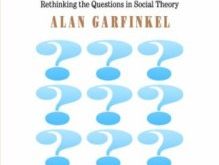Special issue on the public economy and a new public economics download whole issue edited by Michael Bernstein and June Sekera Reconstructing a public economics: markets, states and societies 2Michael A. Bernstein download pdf There is more than one economy 16Neva Goodwin download pdf The public economy: understanding government as a producer. 36 A reformation of public economicsJune Sekera download pdf Economic benefits of public...
Read More »The microfoundations crusade
from Lars Syll I think the two most important microfoundation led innovations in macro have been intertemporal consumption and rational expectations. I have already talked about the former in an earlier post … [s]o let me focus on rational expectations … [T]he adoption of rational expectations was not the result of some previous empirical failure. Instead it represented, as Lucas said, a consistency axiom … I think macroeconomics today is much better than it was 40 years ago as a result...
Read More »War is Peace, Freedom is Slavery, Ignorance is Strength
A piece of work is Professor Walter E. Williams of George Mason University. Back in February, I flagged a column by Williams in which the nimble prof performed the lump-of-labor fallacy shuck and jive. One of the venues for that rendition of Will Automation Kill Our Jobs was David (“Trump is 100% right”) Horowitz’s FrontPage Mag. Little did I know at the time that just three weeks earlier, Williams had penned a defense of Trump’s (Sessions’s, Miller’s)...
Read More »Utopia and work
from David Ruccio The goal of mainstream economists is to get everybody to work. As a result, they celebrate capitalism for creating full employment—and worry that capitalism will falter if not enough people are working. The utopian premise and promise of mainstream economic theory are that capitalism generates an efficient allocation of resources, including labor. Thus, underlying all mainstream economic models is a labor market characterized by full employment. Thus, for example, in...
Read More »The Lump That Begot Trump
I don’t want to pretend that this explains everything. But it is “another brick in the wall,” so to speak, if not the keystone. In January 2015, Senator Jeff Sessions produced an “Immigration Handbook for the New Republican Majority,” written by his communications director, Stephen Miller. Miller’s analysis in the handbook is just the sort of thing that economists would denounce as a “lump-of-labor fallacy.” Curiously enough, few did. They were much too...
Read More »Contrast explanations in economics
from Lars Syll For all scholars seriously interested in questions on what makes up a good scientific explanation, Alan Garfinkel’s Forms of Explanation (Yale University Press 1990) is a must-read. A lot of recent work done within different realist schools in theory of science — e.g. Roy Bhaskar, Andrew Collier, Richard W Miller and Tony Lawson — issue not so little from questions and problems posed by Garfinkel. Especially his advocacy of contrast explanations and critique of...
Read More »Will China go nuclear on patent and copyrights?
from Dean Baker Since Donald Trump has apparently discovered that the US imports more than it exports from China, we can put tariffs on more goods than China can. This means that China has to look to other measures to counter Trump’s trade war. Most coverage of this issue has neglected to mention China’s strongest alternative measure. The nuclear option, in this case, would be to stop honoring US patents and copyrights. This would be hugely costly to US corporations, especially if they...
Read More »Open thread June 19, 2018
Clueless or Just Plain Stupid?
from Peter Radford Here we are deep into the dark forest known as the Trump administration and half my friends are still grappling with the 2016 election result. How come America elected an erstwhile tyrant? How come a boatload of voters look quite happy tossing so-called democracy overboard? Well, as you know, I have a simple answer. Money. Or, more precisely, the lack of it. If there is one characteristic of contemporary America that stands in stark contrast to those happier times a few...
Read More »On randomness and probability in economics
from Lars Syll Modern mainstream economics relies to a large degree on the notion of probability. To at all be amenable to applied economic analysis, economic observations have to be conceived as random events that are analyzable within a probabilistic framework. But is it really necessary to model the economic system as a system where randomness can only be analyzed and understood when based on an a priori notion of probability? When attempting to convince us of the necessity of founding...
Read More » Heterodox
Heterodox





